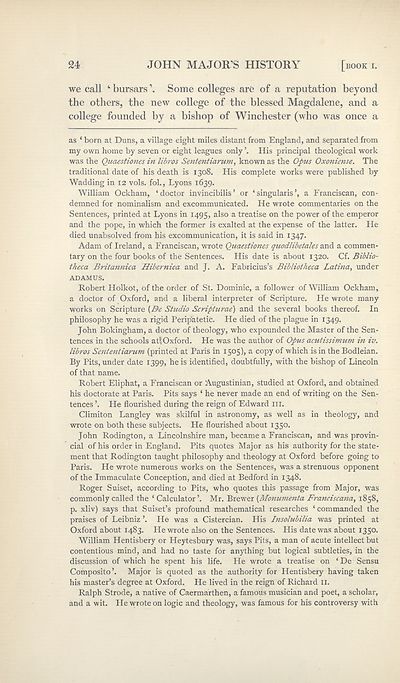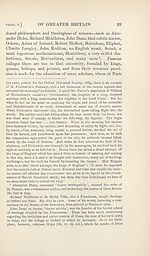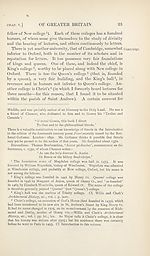Series 1 > History of Greater Britain, as well England as Scotland
(169) Page 24
Download files
Complete book:
Individual page:
Thumbnail gallery: Grid view | List view

24
JOHN MAJOR’S HISTORY
[book I.
we call ‘ bursars Some colleges are of a reputation beyond
the others, the new college of the blessed Magdalene, and a
college founded by a bishop of Winchester (who was once a
as ‘ born at Duns, a village eight miles distant from England, and separated from
my own home by seven or eight leagues only His principal theological work
was the Quaestiones in libros Sententiarum, known as the Opus Oxoniense. The
traditional date of his death is 1308. His complete works were published by
Wadding in 12 vols. fob, Lyons 1639.
William Ockham, ‘doctor invincibilis’ or ‘singularis’, a Franciscan, con¬
demned for nominalism and excommunicated. He wrote commentaries on the
Sentences, printed at Lyons in 1495, also a treatise on the power of the emperor
and the pope, in which the former is exalted at the expense of the latter. He
died unabsolved from his excommunication, it is said in 1347.
Adam of Ireland, a Franciscan, wrote Quaestiones quodlibelales and a commen¬
tary on the four books of the Sentences. His date is about 1320. Cf. Biblio¬
theca Britannica Hibernica and J. A. Fabricius’s Bibliotheca Latina, under
ADAMUS.
Robert Holkot, of the order of St. Dominic, a follower of William Ockham,
a doctor of Oxford, and a liberal interpreter of Scripture. He wrote many
works on Scripture {Be Studio Scripturae) and the several books thereof. In
philosophy he was a rigid Perip’atetic. He died of the plague in 1349.
John Bokingham, a doctor of theology, who expounded the Master of the Sen¬
tences in the schools atSOxford. He was the author of Opus acutissimum in iv.
libros Sententiarum (printed at Paris in 1505), a copy of which is in the Bodleian.
By Pits, under date 1399, he is identified, doubtfully, with the bishop of Lincoln
of that name.
Robert Eliphat, a Franciscan or Augustinian, studied at Oxford, and obtained
his doctorate at Paris. Pits says ‘ he never made an end of writing on the Sen¬
tences ’. He flourished during the reign of Edward III.
Climiton Langley was skilful in astronomy, as well as in theology, and
wrote on both these subjects. He flourished about 1350.
John Rodington, a Lincolnshire man, became a Franciscan, and was provin¬
cial of his order in England. Pits quotes Major as his authority for the state¬
ment that Rodington taught philosophy and theology at Oxford before going to
Paris. He wrote numerous works on the Sentences, was a strenuous opponent
of the Immaculate Conception, and died at Bedford in 1348.
Roger Suiset, according to Pits, who quotes this passage from Major, was
commonly called the ‘ Calculator’. Mr. Brewer [Monumenta Franciscana, 1858,
p. xliv) says that Suiset’s profound mathematical researches ‘commanded the
praises of Leibniz He was a Cistercian. His Insolubilia was printed at
Oxford about 1483. Hewrote also on the Sentences. His datewas about 1350.
William Hentisbery or Heytesbufy was, says Pits, a man of acute intellect but
contentious mind, and had no taste for anything but logical subtleties, in the
discussion of which he spent his life. He wrote a treatise on ‘De Sensu
Composito’. Major is quoted as the authority for Hentisbery having taken
his master’s degree at Oxford. He lived in the reign of Richard II.
Ralph Strode, a native of Caermarthen, a famous musician and poet, a scholar,
and a wit. He wrote on logic and theology, was famous for his controversy with
JOHN MAJOR’S HISTORY
[book I.
we call ‘ bursars Some colleges are of a reputation beyond
the others, the new college of the blessed Magdalene, and a
college founded by a bishop of Winchester (who was once a
as ‘ born at Duns, a village eight miles distant from England, and separated from
my own home by seven or eight leagues only His principal theological work
was the Quaestiones in libros Sententiarum, known as the Opus Oxoniense. The
traditional date of his death is 1308. His complete works were published by
Wadding in 12 vols. fob, Lyons 1639.
William Ockham, ‘doctor invincibilis’ or ‘singularis’, a Franciscan, con¬
demned for nominalism and excommunicated. He wrote commentaries on the
Sentences, printed at Lyons in 1495, also a treatise on the power of the emperor
and the pope, in which the former is exalted at the expense of the latter. He
died unabsolved from his excommunication, it is said in 1347.
Adam of Ireland, a Franciscan, wrote Quaestiones quodlibelales and a commen¬
tary on the four books of the Sentences. His date is about 1320. Cf. Biblio¬
theca Britannica Hibernica and J. A. Fabricius’s Bibliotheca Latina, under
ADAMUS.
Robert Holkot, of the order of St. Dominic, a follower of William Ockham,
a doctor of Oxford, and a liberal interpreter of Scripture. He wrote many
works on Scripture {Be Studio Scripturae) and the several books thereof. In
philosophy he was a rigid Perip’atetic. He died of the plague in 1349.
John Bokingham, a doctor of theology, who expounded the Master of the Sen¬
tences in the schools atSOxford. He was the author of Opus acutissimum in iv.
libros Sententiarum (printed at Paris in 1505), a copy of which is in the Bodleian.
By Pits, under date 1399, he is identified, doubtfully, with the bishop of Lincoln
of that name.
Robert Eliphat, a Franciscan or Augustinian, studied at Oxford, and obtained
his doctorate at Paris. Pits says ‘ he never made an end of writing on the Sen¬
tences ’. He flourished during the reign of Edward III.
Climiton Langley was skilful in astronomy, as well as in theology, and
wrote on both these subjects. He flourished about 1350.
John Rodington, a Lincolnshire man, became a Franciscan, and was provin¬
cial of his order in England. Pits quotes Major as his authority for the state¬
ment that Rodington taught philosophy and theology at Oxford before going to
Paris. He wrote numerous works on the Sentences, was a strenuous opponent
of the Immaculate Conception, and died at Bedford in 1348.
Roger Suiset, according to Pits, who quotes this passage from Major, was
commonly called the ‘ Calculator’. Mr. Brewer [Monumenta Franciscana, 1858,
p. xliv) says that Suiset’s profound mathematical researches ‘commanded the
praises of Leibniz He was a Cistercian. His Insolubilia was printed at
Oxford about 1483. Hewrote also on the Sentences. His datewas about 1350.
William Hentisbery or Heytesbufy was, says Pits, a man of acute intellect but
contentious mind, and had no taste for anything but logical subtleties, in the
discussion of which he spent his life. He wrote a treatise on ‘De Sensu
Composito’. Major is quoted as the authority for Hentisbery having taken
his master’s degree at Oxford. He lived in the reign of Richard II.
Ralph Strode, a native of Caermarthen, a famous musician and poet, a scholar,
and a wit. He wrote on logic and theology, was famous for his controversy with
Set display mode to:
![]() Universal Viewer |
Universal Viewer | ![]() Mirador |
Large image | Transcription
Mirador |
Large image | Transcription
Images and transcriptions on this page, including medium image downloads, may be used under the Creative Commons Attribution 4.0 International Licence unless otherwise stated. ![]()
| Scottish History Society volumes > Series 1 > History of Greater Britain, as well England as Scotland > (169) Page 24 |
|---|
| Permanent URL | https://digital.nls.uk/127733793 |
|---|
| Attribution and copyright: |
|
|---|
| Description | Over 180 volumes, published by the Scottish History Society, containing original sources on Scotland's history and people. With a wide range of subjects, the books collectively cover all periods from the 12th to 20th centuries, and reflect changing trends in Scottish history. Sources are accompanied by scholarly interpretation, references and bibliographies. Volumes are usually published annually, and more digitised volumes will be added as they become available. |
|---|


